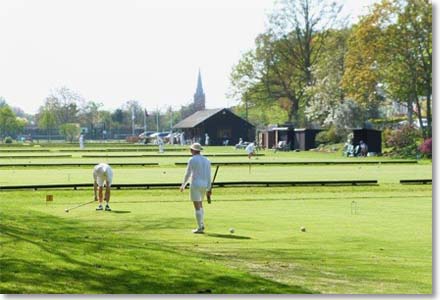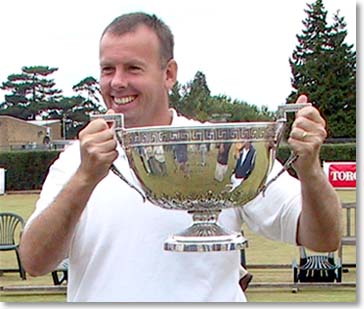

|
Back to |
| The Front Page |
| News & Features |

|
English still rule, with record-setting sextuples |
|
By Bob Alman Photos by Paddy Chapman and as attributed Layout by Reuben Edwards
|
The English Singles Championship (also called the English Open) was at one time the "virtual world championship," before the World Croquet Federation organized around 1990 an annual event allowing for fair representation of all the croquet-playing countries. Two great champions repeated their past clashes in 2021, and this time, Reg Bamford came out on top, helping the event set new records for sextuple peels, and a personal record for Reg: It's his twelfth top trophy for this event.
Paddy Chapman was only one of the recent world champions who competed and among the first to comment on the games. He noted the extraordinary nature of this year's English Open, and to provide plausible reasons for it: "Conditions have to be just "right" for most players to complete sextuples," he noted......In 2018, even triples were rare given the quick pace of the lawns. In 2019, they were also very quick (because of) firm hoops. In 2020 the lawns were dreadfully slow--too slow for most players to play the enormous roll strokes often required.
But Chapman concluded. "This year was an absolute peel-fest as the ground was very soft due to weeks of rain."
Still speaking about the Surbiton event, "Another factor is that in the last three years--2018-2020--only one of Rob or Reg has competed--having both this year surely also helped boost the sextuples."

|
| The Surbiton Croquet Club was founded in 1984 and has grown to become the largest croquet club in the London area, with more than 150 members. Located midway between the Tolworth interchange on the A3 and Surbiton railway station, the Club has seven first-class lawns, a car park and a large club house with full catering facilities. Photo from the Surbiton Website. |
Rob Edlin-White looked up the Opens records for the last three decades and reported that over that period, the sextuple had, in fact, become a winning tactic, paying off more often than leading the intrepid player into disaster. He noted that the introduction of a Super Advanced version of the rules gave players incentive to practice and master the tactic.
He noted that in the years 2018-20 only one sextuple was completed in the high-level English singles championship, but that more than one-third of the matches in 2021 included sextuple peels.
Others quote the statistics and pronounce conclusions
Marcus Evans produced stats from the Chris Williams website ( http://www.croquetrecords.com/ ) to prove that "English Croquet is doing just fine." The sport started there in the 1850's, as a garden game, and quickly developed into what is now known by the general public as "the world's slowest sport," taken up by all the Commonwealth countries. But in recent years, a very interactive game using the same equipment on the same court has changed that perception: Golf Croquet, which allows all the players to remain on the court at the same time, with play rapidly switching (in most games) from one player to the next. Some accomplished players of the traditional game insist that "Golf Croquet" is not croquet at all: it's just a social game, played on the same court with the same equipment, but it's definitely not croquet, they insist.
Evans said he "just wanted to pick up on the point raised by (former Brit) Chris Clarke that it may have been the first time ever that none of the most recent England Mac team reached the semifinals. I assume he was implying this is further evidence of a decline in the standard of English players.
(The MacRobertson Shield event, held every three years or so, is competed for teams of six players each from among the top four qualifying nations--England, New Zealand, Australia, and the United States. England has dominated over that time but Australia and New Zealand have improved their results in the last decade.)
"But that isn't the case," Evans says. "From about 1990 to 2010, the English Mac team was extremely fortunate to be able to call on three or four of the ten (or so) best players to have ever played the game. (He cites these players--all world champions at one time or another--as follows, "in no particular order," as his top 11. Fulford, Bamford, Clarke, Maugham, Solomon, Aspinall, Jackson, Prince, Fletcher, Chapman, Mulliner.)
Nailing down the point....

|
Evans hammers down the point: "This year, several very strong players were eliminated despite seemingly playing pretty well--you just could hardy afford any mistakes. Partly that is down to the smaller number of rounds, but mostly I think it was the strength of the field. There were virtually no 'easy' games in the qualifying round, and certainly not in the main draw.
"I think English croquet is doing just fine."
Most of this article was taken from the Nottingham Board, a long-established newsgroup that allows all the best players in the world to be in touch with each other. (See "All about the Nottingham Board.")